Disclosure: Meeple Mountain received a free copy of this product in exchange for an honest, unbiased review. This review is not intended to be an endorsement.
In this review anything that might be considered a spoiler is hidden in a collapsible window with a spoiler alert on it. In all other ways, this review is spoiler-free.
Deckscape is a series of cooperative escape room board games that promises to offer “all the thrills of a real escape room” in a deck of cards. Each Deckscape game comes in a typical card-size box — think The Mind or 6 nimmt! — with 60 large cards. Each game needs 1 to 6 players and about an hour to complete. The goal of each Deckscape game varies: sometimes you’re tasked with solving a mystery, while other times you might be exploring a new land. What remains consistent is that players will face a variety of different riddles and puzzles in order to accomplish the game’s goal. Since each game tells a different story, each Deckscape game is a standalone experience — players don’t have to play them all to understand the story or play them in any specific order. Unfortunately you can only play a Deckscape game once since you’ll have completed all of its puzzles, but there is no component destruction so they can be passed on to another game group.
How Deckscape Works
The Deckscape games are some of the easiest escape room games to jump into; simply open the box, remove the deck of cards and start reading. Occasionally there might be other objects in the box, but everything is so clearly labelled with big red text and Stop signs that you won’t accidentally stumble upon something.
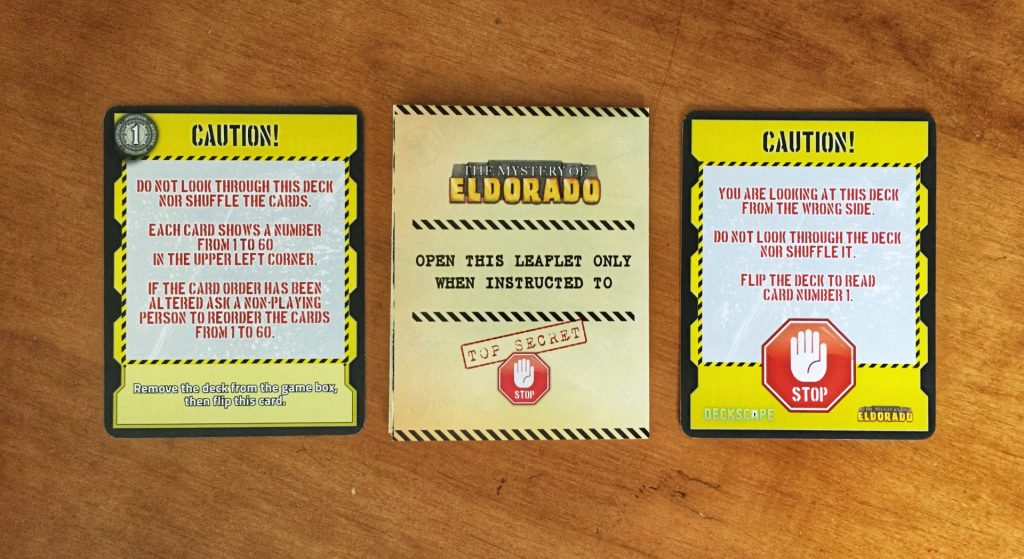
The game clearly instructs players when to flip a card or proceed to the next one — and will scold and penalize you for not following a card’s instructions.
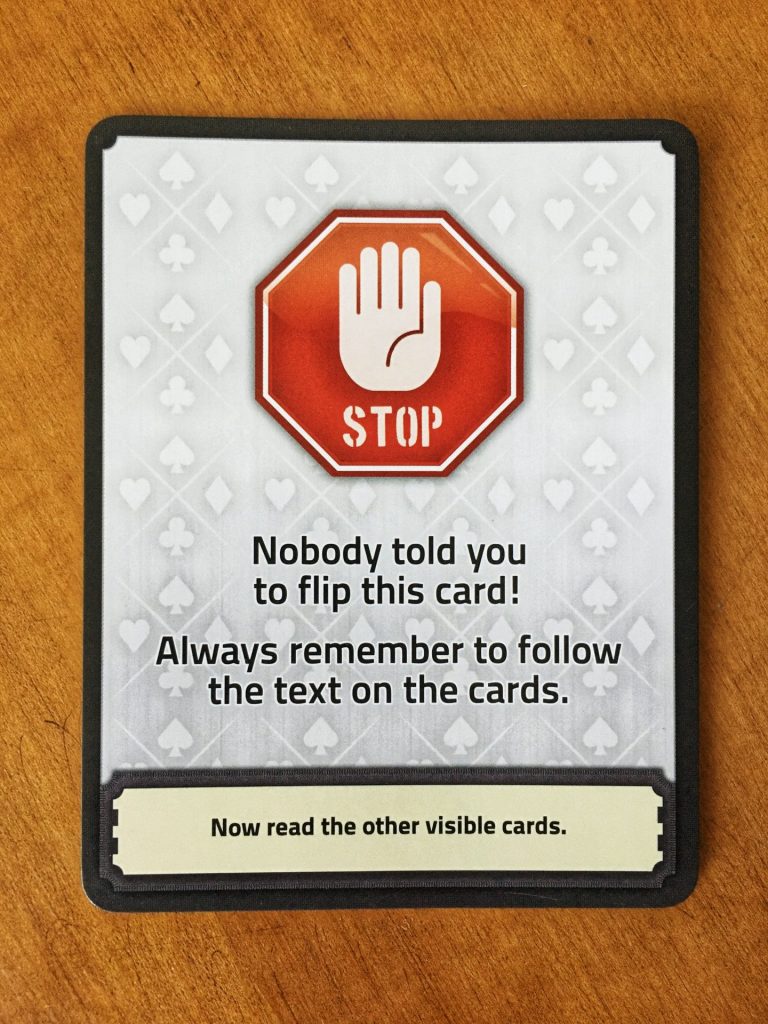
As you read through the first few cards, you’ll learn three important things: the game’s background story, your mission, and the kinds of cards you’ll encounter (Item and Puzzle).
Item Cards
When players discover an Item card, it remains faceup on the table. An Item card might provide information or clues to solve a puzzle, but it might also need to be “used” for a puzzle. Consider an Item card that shows a lighter in a personalized case. The case might have an engraving on it that gives a clue for a certain puzzle or the lighter might need to be used to set something on fire. Item cards might also be useful more than once so it’s important to not discard them.
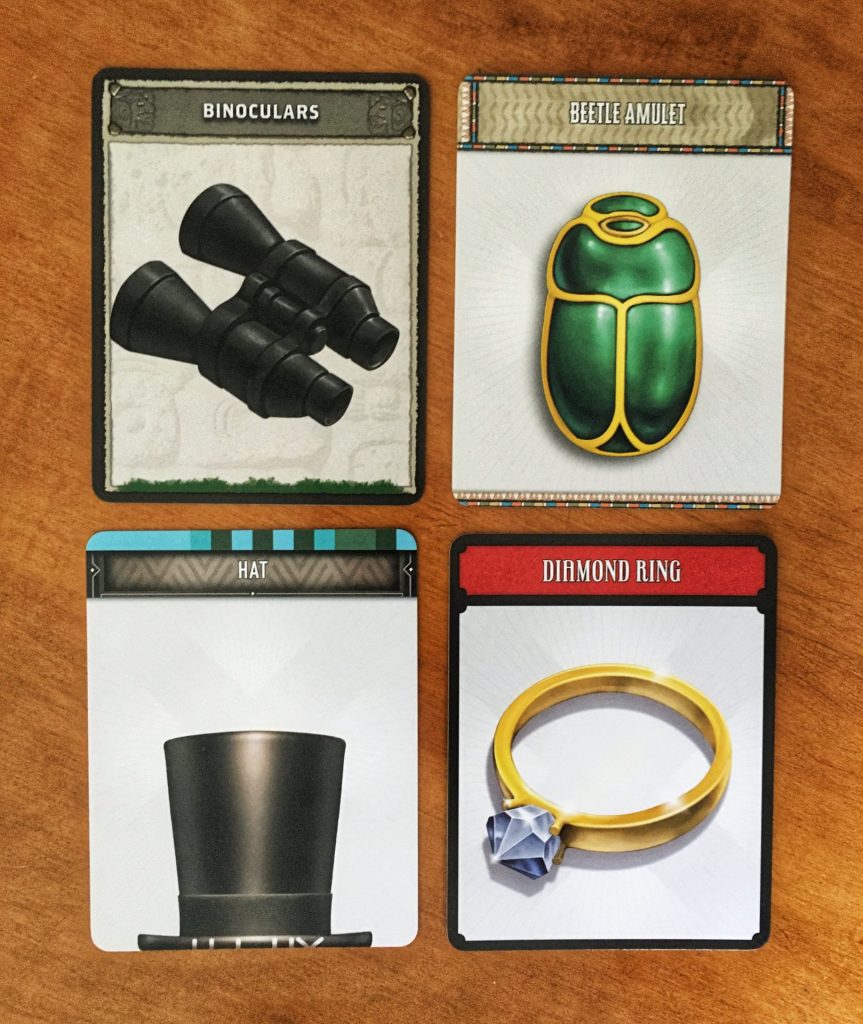
Puzzle Cards
Puzzle cards feature a picture and a question and it’s up to the players to find the solution to the puzzle’s question. Once players think they’ve found the answer, they flip the puzzle card to check if they’re correct. This means that you only have one chance to solve a puzzle. If your answer is incorrect or you didn’t have all the required Item cards, it counts as an error and is deducted from your final score.
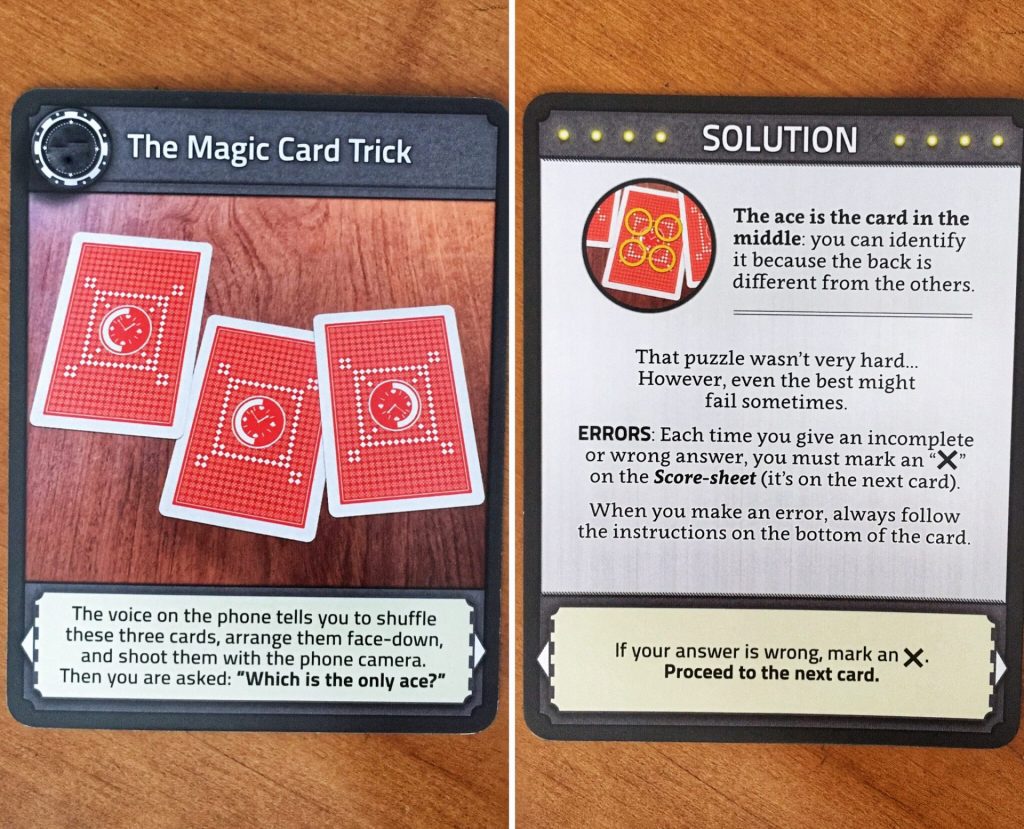
Each Deckscape game begins with an easy puzzle to get players used to the system, easing you into the gameplay. However, even on this first puzzle, players are penalized for an error and must note it — according to that specific game’s criterion on the score-sheet. Instructions for all of this are, you guessed it, written on the cards.
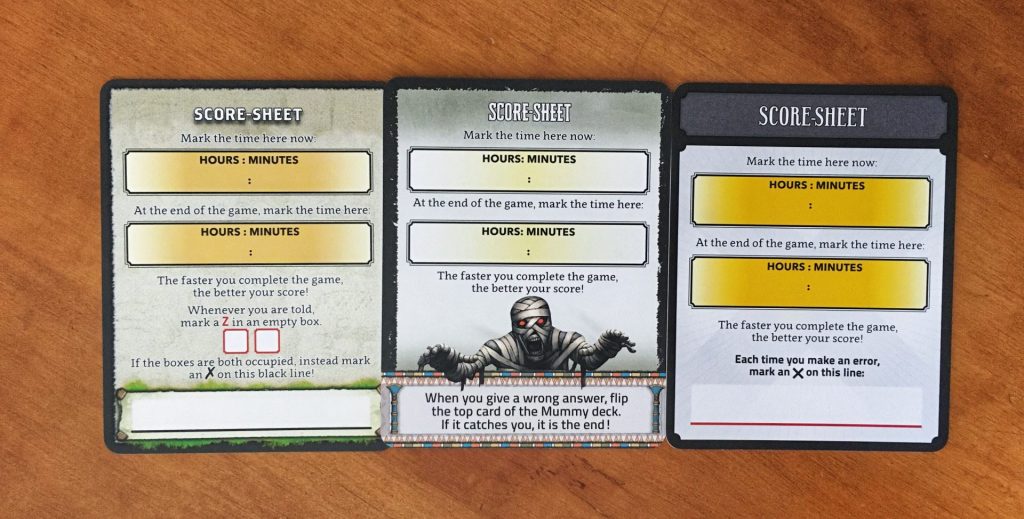
Clues
At some point in the game, players reveal cards that have clues for the puzzles. These clues essentially provide the solution and players are encouraged to use them without any penalty if they want an easier game.
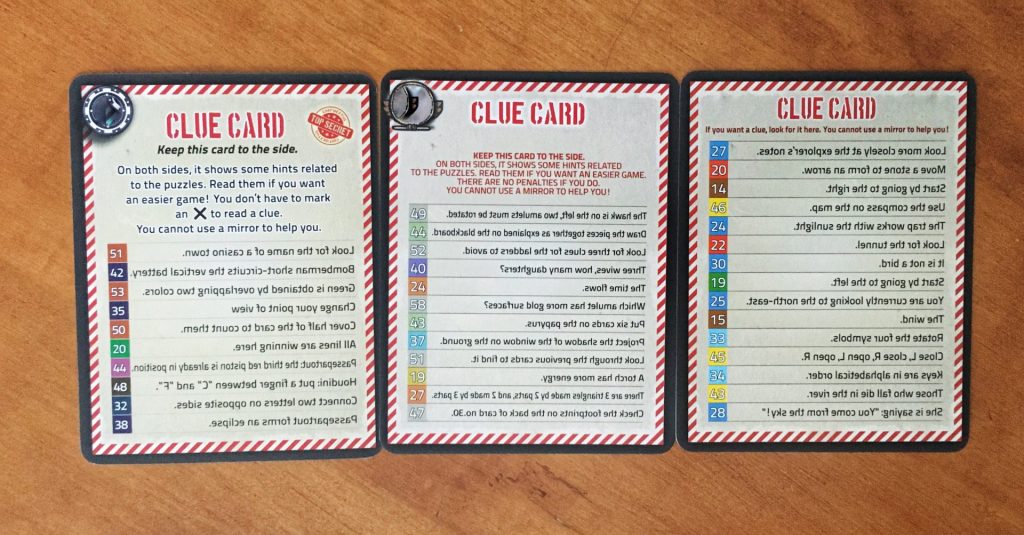
Your Deck-scape
You’ll know you’re nearing the end of your mission because you’ll have very few cards left in the deck and you’ll feel the game’s story coming to a conclusion. At the end of the game, a Finale card tells you how to score your gameplay based on how long it took you to play — any errors will add more time. Depending on how successful you were in your adventure, players will feel a great sense of accomplishment or defeat.
Which Deckscape Game to Choose?
The publisher of Deckscape, dV Giochi, releases new games in the series each year so at this point there are a number to choose from. No matter which Deckscape game you choose as your first experience, there is a bit of a learning curve when it comes to getting used to the system, especially knowing whether you have all the Items and information required to solve a puzzle. Once you flip over a card, there is no going back — and often that means suffering consequences. There are, however, some Deckscapes that I wouldn’t recommend as starting points. Here I’ll provide some details on how each game works in the Deckscape system and some brief thoughts so you can gauge which one is the best fit.
These are presented in order of release.
Deckscape: Test Time (2017)
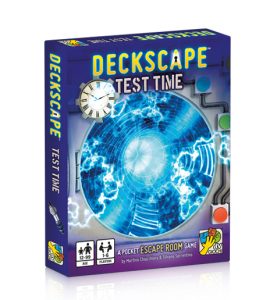
In Deckscape: Test Time players are selected by Doctor Thyme (I couldn’t make up this name if I tried) to help him work on a new project, but first you must pass his test and prove yourselves worthy. Even though this was the first published Deckscape game, the designers did a lot of things right; they created a simple system while still making complex puzzles. There is also a lovely choose-your-own-adventure element to the game that will likely make your group’s gameplay experience different from someone else’s. This is a good Deckscape game for beginners to jump into the Deckscape world, but don’t be surprised if you misjudge or overlook things; this is inevitable in most Deckscape games until you become more familiar with them. Thankfully Deckscape: Test Time doesn’t punish you too harshly for it.
This is my favourite of the six Deckscape games.
Deckscape: The Fate of London (2017)
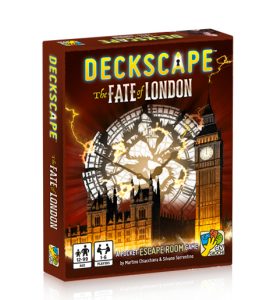
As the game’s title suggests, the fate of London is in the players hands in this Deckscape game; four dangerous devices are hidden throughout the city and players must defuse them before midnight, otherwise…well you can imagine what might happen. I like the concept of Deckscape: The Fate of London, but I found most puzzles didn’t align with the theme and much of it felt too obscure. There were also incredibly stressful moments in this game and while I sometimes welcome this added tension in an escape room, it was too much here. The puzzles were quite difficult and this extra stress nearly pushed me over the edge. That’s not to say that it was all bad. There is a very stunning moment near the end that is all at once maddening and really cool. Deckscape: The Fate of London is also not a game for beginners — and even when you have experience with the Deckscape system, it will likely still pose quite a challenge.
This is my second least favourite of the six Deckscape games.
Deckscape: Heist in Venice (2018)
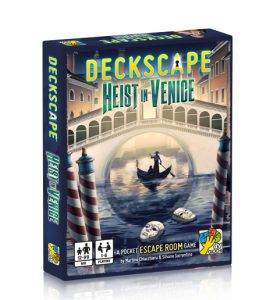
In Deckscape: Heist in Venice your group is essentially threatened into robbing a casino in Venice (think Ocean’s 11). What’s interesting about this Deckscape game is that it introduces characters. Each player assumes the role of a character (sometimes more than one if you play with fewer than 6 players) with a criminal specialty. Each player has information about the game that only they know — because of their speciality — so players need to really cooperate to solve the puzzles. It’s a neat way to keep all players engaged in the gameplay experience. Deckscape: Heist in Venice has some clever, albeit tricky, puzzles. Many puzzles are very math-heavy or use a lot of deduction. If this is your jam — like it is mine — then you will enjoy this game, whether this is your first Deckscape game or not.
This is my third favourite of the six Deckscape games.
Deckscape: The Mystery of El Dorado (2018)
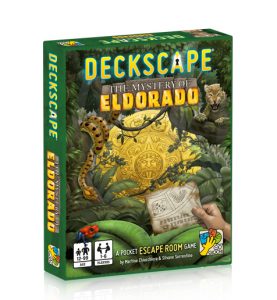
Your expedition in search of the legendary city of El Dorado was a bust. As you leave on your flight home, something crashes into your plane, forcing you to parachute to safety and attempt to survive in the Amazon. This is one of the most immersive (read: thematic) Deckscape games you’ll play. Errors are scored differently in this game which make it feel more like you are trying to survive in a jungle and less like you are trying to “escape” a locked room. Much like a Choose Your Own Adventure, there are also many points where players make decisions for their survival, which could change the route of their gameplay experience. However, Deckscape: The Mystery of El Dorado doesn’t sacrifice puzzles just because it’s more of an adventure; the puzzles are solid and quite a mixed bag of different types. That’s not to say they’re all perfect. I was pretty upset about how the designers handled one puzzle and there were a couple purely time-wasting puzzles in the game.
An interesting aspect of Deckscape: The Mystery of El Dorado is just how closely you have to pay attention to everything — and then later remember it. I can see this leading to a lot of frustration for players who aren’t used to this, even in an escape room game.
This is my fourth favourite of the six Deckscape games.
Deckscape: Behind the Curtain (2019)
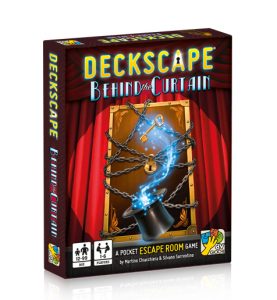
In Deckscape: Behind the Curtain you’ve been anonymously invited to a famous magician’s last show. The show is sold out so of course you attend without hesitation. The best part of Deckscape: Behind the Curtain is that it teaches you a “magic trick” that you can use at your next dinner party to amaze your guests (assuming the world will one day be safe enough to have parties again). Initially this “escape room game” felt more like a decoding exercise, asking players to closely observe the magic tricks and then explain them. While this all made sense with the story, I was glad when the game reached its turning point and I was solving real puzzles — although some of these puzzles were quite frustrating. Even though there were also some interesting ones, Deckscape: Behind the Curtain didn’t work for me. It wasn’t great and it wasn’t terrible; it was simply “okay”.
This is my least favourite of the six Deckscape games.
Deckscape: The Curse of the Sphinx (2019)
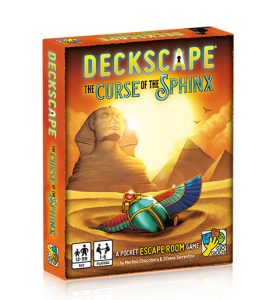
You begin your adventure exploring the monuments of ancient Egypt when suddenly you get trapped in a secret room and must find a way out. Deckscape: The Curse of the Sphinx has as much, if not more, thematic flare as The Mystery of El Dorado — especially with the awakened mummy on your heels the entire game. This mummy is used to not only make the experience more tense and immersive, but it also reimagines the Deckscape error system — and often punishes you terribly. Overall Deckscape: The Curse of the Sphinx is quite challenging and I wouldn’t recommend it to anyone just getting into Deckscape or escape room games in general. Once you’re ready, though, The Curse of the Sphinx is worth seeking out; as challenging and punishing as it can be, it’s also really rewarding.
This is my second favourite of the six Deckscape games.
To sum up, my favourite Deckscape games are as follows:
- Deckscape: Test Time (favourite)
- Deckscape: The Curse of the Sphinx
- Deckscape: Heist in Venice
- Deckscape: The Mystery of El Dorado
- Deckscape: The Fate of London
- Deckscape: Behind the Curtain (least favourite)
Final Thoughts
The quality of escape room games as part of a series — like Deckscape, Unlock!, or Exit: The Game — is often hard to reliably predict; just because one game is fantastic, doesn’t make it true for the next release and vice versa. Deckscape is no exception to this. Some of the games are great and challenging experiences, some are incredibly frustrating, and others fall in between these two extremes. So what, if anything, makes Deckscape stand out in the crowd of escape room board games? The Deckscape games do a few things very well: they are easy to jump into, they are simple yet more thematic, and they are great for keeping large groups of players engaged.
The Deckscape games are the easiest escape room game to jump right into because there is no rulebook. Much like a Friedemann Friese Fast Forward game, you just open the box, unwrap the cards, and start reading them. The game then directs you on how to proceed from there. Easy peasy. While there is no real tutorial to familiarize players with Deckscape’s system, each game does begin with a simple puzzle to ease players in.
Next, Deckscape somehow manages to create a simpler gameplay experience — there’s no need to fidget with apps or worry about inputting codes correctly into some device — and yet when you play the games, you feel more immersed in the setting. Oftentimes when I’m playing an Unlock! or an Exit game, I don’t really feel like I’m there trying to outsmart an evil clown or escape from a castle. With Deckscape, I do feel like I’m taking part in a magic show, outrunning a mummy, or trying to survive in a jungle. For an escape room game that is so inexpensive and uses so few components, that is a pretty impressive feat. On that note, Deckscape games can be passed on to other players once you’ve completed them, meaning you’re really getting your money’s worth.
Finally, Deckscape not only accommodates a large player count, it does so well and in a way that all players can feel engaged and like their participation is meaningful. Have you ever played an escape room game with a group of, let’s say, 4 players and you have to politely fight over the limited number of components or crane your neck to read something on the table through a sea of other players’ arms? Maybe you even eventually give up and just kind of sit there, waiting for the other players to ask for your input. Most escape room games, no matter what their boxes say, only work with a small group. This, however, is not true for Deckscape; each game accommodates between 1 and 6 players well (The Heist of Venice especially because it gives each player a character and pieces of information only they know). But, the Deckscape system as a whole has been designed to actively engage and encourage collaboration. Shortly into a game, players are always instructed to divide the deck of cards into piles (that are colour and number-coded); any Puzzle card that is visible is fair game for players to work on solving. This means players can divide up, delegate the work, and regroup with the new information and items they gained from their pile of cards.
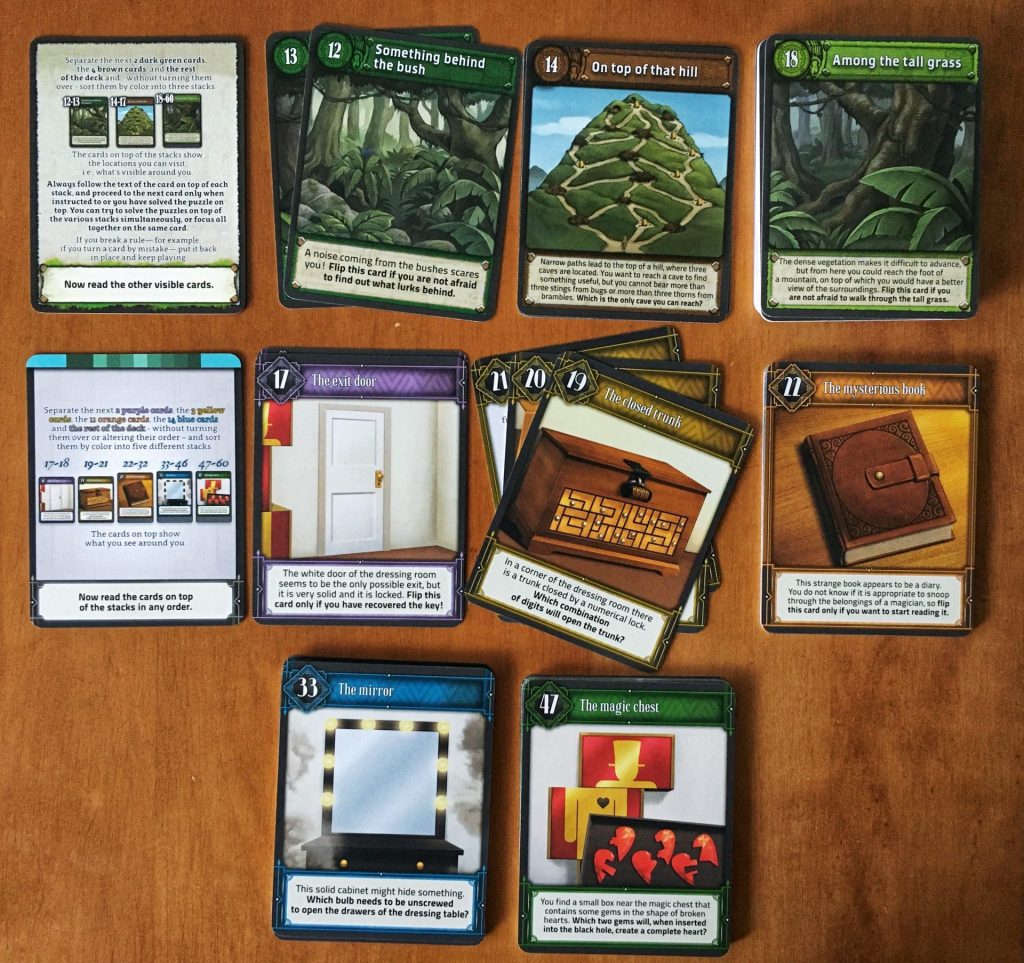
While Deckscape isn’t my favourite of the escape room systems, I always enjoy my plays of the games — obviously some more than others. I enjoy how engaging the Deckscape games are, how they feature a variety of puzzles, how they accommodate large groups, and how they transport me into the story’s setting. For this, I continue to look forward to the new releases put out in the Deckscape series of games.


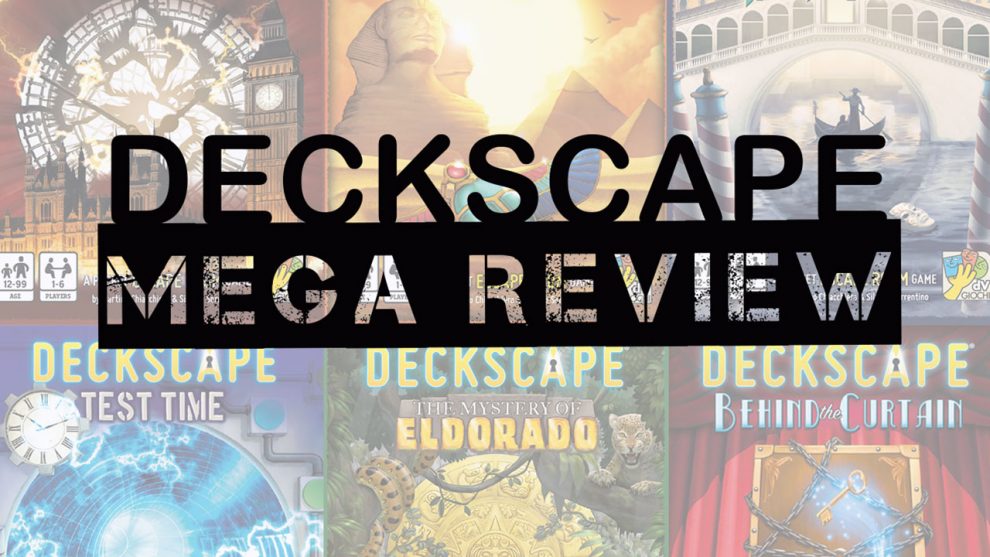
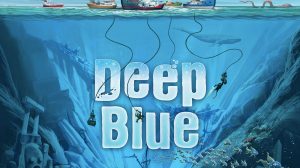
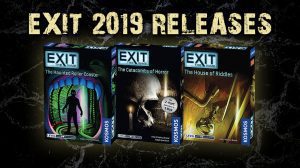






I’d love to know how you rank the latest three additions to the series
Hi Ashley, I was contemplating on buying Deckscape, havent played any escape games yet, and I feel Deckscape is a good place to start. Also what would be your favorite escape room system games. Look forward to hear from you.